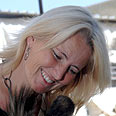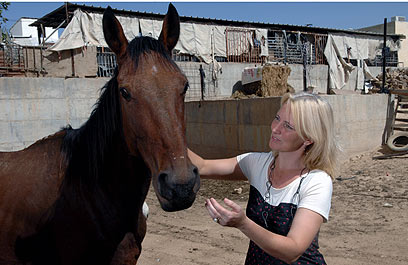
Queen of the desert
British tourist who married Bedouin man 17 years ago, converted to Islam, and made Negev her home aims to make a change in Bedouin society in terms of treatment of women and animals
"I'm a Bedouin for all intents and purposes," she declares, but her British past is apparent in her lifestyle. She speaks fluent Arabic, treats her husband's mother like her own, but will never wear traditional Bedouin clothes and finds the social conventions – like the one prohibiting a Bedouin woman to ride a horse or the problematic treatment of animals – unacceptable.
Twenty-three years have passed since her arrival from Birmingham, England at age of 19 – when her name was still Janice Perry – for a summer vacation in Eilat, where her friends worked in hotels. A meeting with Talab Abu Hani, a 24-year-old waiter at the Red Rock Hotel, changed her life.
"We went out a few times, and even traveled to Sinai together," she says. "It was really fun. We spent two weeks together."
Did you know he was Muslim?
"Yes, and I really didn't mind. The important thing is that he's a good person. Color, religion – I don't really care. It's the education I received from my parents."
Talking in sign language
She only spoke English at the time, he spoke Arabic and Hebrew, and yet they managed to communicate despite the language barriers. "We spoke some English, which he didn't really know, some Hebrew, and a lot of sign language," she says.
Today Talab is fluent in English and Janice has made Arabic her mother tongue. She can handle Hebrew quite well too. At home they mainly speak Arabic, and when Janice talks to her children in English they respond in Arabic.
After spending time together in Eilat, Janice returned to England and exchanged love letters with Talab, but was overcome by emotion and later informed her parents that she wants to return to Israel and settle there. "I sold my car," she recalls, "got money and bought a one-way ticket."
How did you parents react to this decision?
"My father was okay with it. It was more difficult for my mother. But she told me that I could always call and they would help me."
Janice arrived in Eilat, and Talab helped her get a job as a hotel chambermaid. She later worked as a bartender. When she turned 21, she flew back to Birmingham with Talab, who met her parents for the first time. After six more months in Eilat, she decided to return to her hometown together with Talab.
"The problem was that they told him that if he came with me and stayed there, he would have to get married within three months," she says. "My plan was to get married in June, in the summer, but we were forced to wed in January. We had a small Christian ceremony. In England there's no problem marrying someone of a different religion. Talab's family wasn't there, and after the wedding we sent them pictures."
Their three children have a British citizenship. First came Michael, 18.5, then Sami a year later, and 16-year-old Adam was born after they returned to Israel for a short period and then went back to England.
"I was pregnant in Israel, in Eilat, but then I realized that they put several women in one hospital room here, while in England each woman gets her own room, so I preferred to give birth there," she says. "Talab's family was very happy that I had three sons. Boys count a lot among the Bedouins."

'If they abuse animals, they'll do it to humans too' (Photo: Haim Hornstein)
Their son Sami's asthma was the main reason for the return to Israel. Janice will never forget the night she landed in Israel and then arrived in Rahat.
"It was 2 am," she recalls. "Talab's entire family was there. They immediately jumped on the children and took them away, and I found it strange. I wouldn't even let my mother have them. We arrived in Rahat at night.
"The city looked nice, with a lot of lights. In the family home everyone checked me out and looked at me, wanting to see who Talab's wife was. They rejoiced and were very warm to me. They opened a long table and slaughtered a sheep. The Bedouins are unique people. Pay me and I won't return to England. I love my life here."
When she woke up in the morning, she was surprised by what she saw. "It was 17 years ago, and it's very different from today. All the women looked alike, they were all in black. You couldn't tell who was who."
The cultural gaps were very big as well. She was forced to watch teachers hitting their students in school, and even wrote an article about it which sparked a row in the city. "I wrote in the local paper about what I saw, without saying who the beating teacher was," she noted. "But everyone knew where I was sending my children to, so it created a mess."
Did you manage to make a difference in the city in terms of violence?
"It takes a long time. It's a process. This is the way they were raised, it's their culture. It all depends on education. If they abuse and kill animals, they'll do it to humans too. You need a lot of patience. Children who beat up a dog don't understand that it's wrong."
Rats in the room
Janice deiced to try to change the situation, and as part of NISPED - the Negev Institute for Strategies of Peace and Development, she began touring Bedouin villages carrying different animals, like rabbits and mice, and teaching the children about them.
"It takes time getting to know something new," she says. "I visited a few villages and saw a lot of violence towards animals. They throw stones at them, tie a pigeon to a rope, and it's just shocking. The children waited there for me every week. They learned, for example, that you don't pick up a rabbit from its ears."
When the project's budget was finished, Janice didn't despair. She registered at MATI, the Jerusalem Business Development Center, and learned how to run a business, issued an income tax and VAT permit, received a certificate and opened a business.
The different animals are kept in a room at the Abu Hani home. They include rabbits, rats, mice, a duck, and hamsters. A donkey and a horse live together in the yard. "I bought the horse for NIS 100 (about $27) from children so they would stop abusing it. It was constantly beaten up. It was all skin and bones."
Today the horse has completely recovered, and Janice and her son ride him despite a surprising difficulty.
"In the Bedouin sector," she explains, "a woman is not allowed to ride a horse. So I woke up at 4:30 am and went out to ride before everyone else got up. I rode in the fields near Rahat, in the kibbutzim area. I rode for two hours and went back home to prepare the children for school. Later I began leaving in the middle of the day. People would talk about me, children would throw stones at me, and I was even injured. I spoke to the children's parents, who understood me. They were in shock when they saw a blonde woman from Rahat riding a horse. There are still people who haven't gotten used to it."
Now Janice is looking for financial help to open an association and teach children in the Bedouin sector about animals. She has already visited the mayor. "He told me I should set up a mini-zoo and even a society for the prevention of cruelty to animals in Rahat," she says. "It could really help all the animals in the city."
It used to be my home
The Israel Land Administration recently razed the unrecognized village of al-Arakib, north of Rahat, for the sixth time. Janice, like her friends, is very uncomfortable with the situation.
"It's hard for me to see this. It's their land," she says. "It's very hard to put a person who has been free all these years between four walls. My husband's father lives in a tent next to his home. It was hard for him to move into a house."
Would you move into a tent?
"If it were up to me, I'd move into a tent today. Bring me some sheep and I'm fine. I think I'm more of a Bedouin than my husband. I'm definitely more Bedouin than British."
Janice converted to Islam 17 years ago, when she married Talab in a small ceremony at a Sharia court in Israel. "Apart from the clothing," she says. "There's no way I'm going to put anything on my head and wear traditional clothes. I respect my husband, but I'm only Muslim on paper."
Being Bedouin creates many difficulties for her in quite a few places. "When I traveled I was detained for a security check at Ben-Gurion Airport for three hours. They opened my bag and undressed me, just because of my name," she says.
"A while I go I was at the central bus station in Beersheba and spoke Arabic with Bedouins. A guy in plain clothes, who works in immigration, approached me, took me aside and asked for my ID card. He asked me, 'How do you know Arabic?' I really feel what the Bedouins feel."
Janice is currently defined an Israeli resident without a citizenship. She would rather not discuss politics, but vows that her children will not go to the army, unlike many young Rahat residents.
"I don't want them to join the army," she says. "We have family and friends in Gaza, and I am against what the IDF is doing there. I am against terrorism in general. Why can't people live together? There is enough land for everyone. I've had enough of all the wars."
Six years ago, Talab and Janice decided to adopt Qamar ("moon" in Arabic), a three-year-old girl from Jerusalem. "I asked for a retarded child, but the welfare serviced didn't have one for adoption," Janice says. "She wouldn't talk, and now she won't stop talking and studies in a school in Rahat."
The couple also serves as a foster family to a five-year-old child from the Segev Shalom community. Soon they plan to move from their rented home to a new house in neighborhood 7, near Talab's family, where they'll have enough land for all of Janice's animals.
- Follow Ynetnews on Facebook










